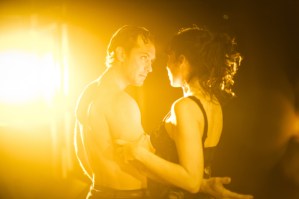Review: Woyzeck in Winter (Barbican)
The Büchner and Schubert mash up is a collaboration between Landmark Productions and the Galway International Festival
It’s a depressive’s dream – a mash up of two of the most gloomy works in the German language, one which adds Schubert’s Winterreise to Büchner’s Woyzeck and emerges with a piece of musical theatre of concentrated bleakness.
The attractions of the idea are, when you come to think of it as director and adaptor Conall Morrison obviously has, obvious. Both are works shadowed by the early death of their authors: Schubert’s at the age of 31 from the complications caused by syphilis, Büchner of typhus at 23. Both pieces were left unfinished: the play in fragments, the song cycle awaiting final corrections. Both depict the agony and isolation of men whose lover has spurned them. Both also share a quality of existential despair that goes beyond the specific to accuse the universe itself of uncaring harshness.
This production, a collaboration between Landmark Productions and the Galway International Festival, emphasises this metaphysical quality with Jamie Vartan’s set – of a mountain of dilapidated piano frames, which emit hollow sounds as the cast scramble up and down them. Beneath sits pianist and music director Conor Linehan playing the haunting Schubert songs, beautifully.
Those songs become a musical score, sung not by one Wanderer, but by the entire cast, pointing up the action, fitting seamlessly into its unfolding. The tone is set by the opening, when Rosaleen Linehan shuffles on as the Hurdy Gurdy man and sings the last song of the cycle, with biting power, as snow falls onto her head. At the close, in a chillingly effective moment, Woyzeck joins her in the song.
It is throughout the shape of the play that drives the action as Woyzeck is first driven mad by circumstance and cruelty and then propelled to murder his lover by her betrayal with the glamorous Drum Major. Patrick O’Kane is hypnotic as Woyzeck; wild-eyed and lost, clinging desperately to his sanity. He looks so frightened and fierce that the gentle power of his singing voice is a surprise. It feels like an expression of his soul. Camille O’Sullivan is also charismatic as Marie, nearly making sense of the character’s behaviour, and bringing husky-voiced intensity to the songs, longing for a better life, for the blossom of the linden tree, not the squalor of her existence.
In fact, the entire cast is top-notch, with Barry McGovern notably creepy as the demented Doctor and Stephen Brennan a disturbing Captain. It looks wonderful too, with Beckett-like tramps stalking the scenes in shadowy lighting (by Ben Ormerod) that effortlessly conjures a rising moon, a brightly lit fairground and the darkening wood where Marie meets her fate.
But I couldn’t help feeling that Schubert was the loser in the encounter between play and song. His songs, with Stephen Clark’s pungent new translations of the Wilhelm Müller poems on which they are based, are forced into a kind of Kurt Weill mode to suit the mood. For all their darkness, this great song cycle has a momentum that runs counter to Buchner’s despairing fall. It’s interesting to see how they work alongside each other, but the juxtaposition is not illuminating. It simply is.
Woyzeck in Winter runs at the Barbican Theatre until 16 September.














